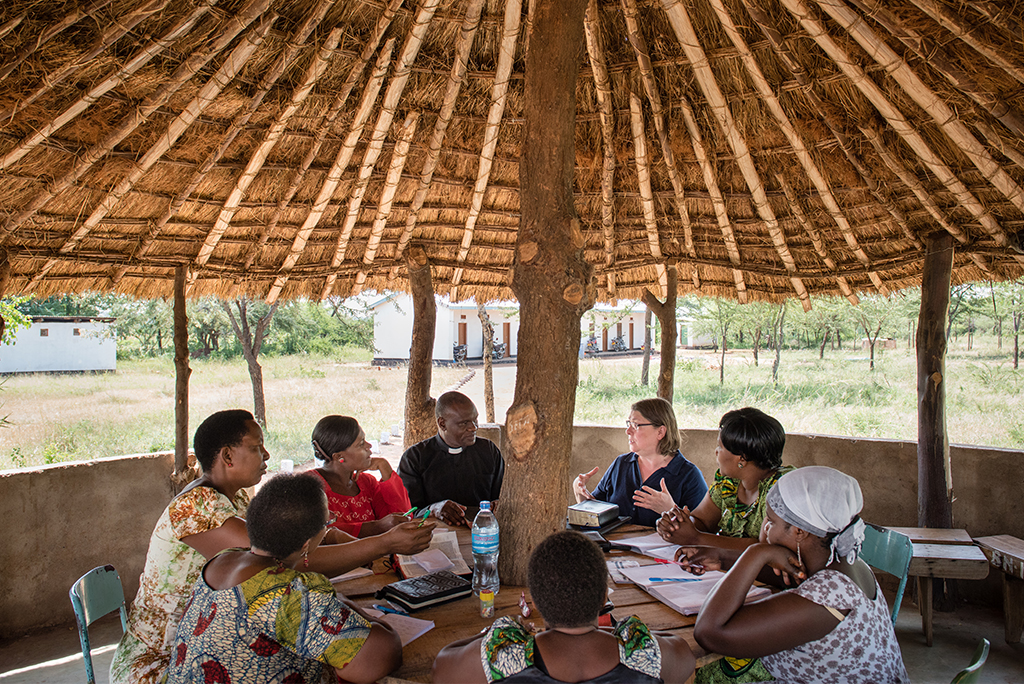
By Pamela J. Nielsen
ST. LOUIS — In his report to the LCMS Board for International Mission (BIM) at its meeting here Jan. 28-29, LCMS President Rev. Dr. Matthew C. Harrison spoke of the unexpected phone call and subsequent visit of Sudanese Anglican Church leaders who told him, “we have been reading the Catechism, looking at your website [and] we want to join you.” Harrison noted that the leaders of this church body with a million members are determined to confess as Lutherans and partner with the LCMS.
Harrison also relayed the story of a small Lutheran group from the foothills of the Himalayas who have been without the catechism or The Book of Concord, explaining that church bodies that desire closer ties with the LCMS are increasingly approaching the Synod.
“They want to know more,” he said, underscoring the most frequent request the LCMS receives from Lutheran church bodies and groups around the world — for theological educators.
Africa’s significance
The significance of Africa on global Christianity, past and present, emerged as an unplanned theme at the BIM meeting. The Rev. Dr. Douglas Rutt, director — International Ministries at Lutheran Hour Ministries, described that LCMS auxiliary’s plans for expanded media outreach in northern Africa, an area heavily populated with followers of Islam.
The Rev. Dr. Joel Elowsky — professor of Historical Theology and director of the Center for the Study of Early Christian Texts at Concordia Seminary, St. Louis — explained the significance of African Christianity and the false notion that “Christianity is white man’s religion and that the indigenous religion is Islam for Africa.”
“Half a billion Christians will soon call Africa home,” said Elowsky, who made the case that “we neglect this part of the body of Christ to our peril.”
Elowsky listed off a who’s-who of significant thinkers and church fathers — Tertullian, Clement of Alexandria, Origen, Cyprian and Cryil of Alexandria — describing these Africans’ influence on Christian thought against the backdrop of persecutions, emerging church orders and the establishment of church doctrines regarding Christ and the Holy Spirit, in the face of increasing and significant heresies.
As the western Christian world witnesses the rapid growth of Christianity on the African continent today, “we don’t just give, we need to receive, and be able to receive from the churches in Africa,” said Elowsky.
International schools
The board discussed a report from its subcommittee on policy 7B: Association with International Schools. Committee member Butch Almsted noted there are significant questions facing the board, such as determining the steps the board should take with existing schools in shoring up their Lutheran identity. Almsted encouraged the board to be more proactive and asked, “What can the OIM do with respect to how they operate [with the schools] within legal parameters?”
The board agreed that the three international schools in Hong Kong, Hanoi and Shanghai are unique, as are the challenges each faces in faithfully teaching Lutheran theology, and that they require individualized attention by the OIM.
Executive’s report
OIM Executive Director Rev. John Fale reported on the paradigm shift in mission work that has resulted in many congregations and groups across the Synod that are involved in international mission work. Fale noted that he has been intentionally reaching out to these groups, learning about them and inviting them to walk with the Synod in mission work. “I am thankful for it, for congregations, districts, mission societies and Recognized Service Organizations who have a great zeal for bringing the Gospel,” said Fale. He noted that the “challenge is that when we do not do this in a collaborative, cooperative, coordinated way we are poor stewards of the resources God has given to us and we actually cause harm out in the field. “
Fale invited board members to share their wisdom, experience and insights now and in the future.
“I’d value getting your thinking on things, and not just concerns,” said Fale, “how can we be the most effective [working together]?”
Board action
The board welcomed new BIM member Jerry Frese, who replaced Judge David Bruns.
Six rostered church workers were called and one layperson was appointed for service in Eurasia, East Africa and Latin America.
“There are changes in our demographics, funding patterns, partner churches and even changes in how some look at the very nature of mission,” said the Rev. Bernie Seter, chairman of the Board for International Mission. “There are wonderful opportunities to walk with those around the world who want to be true to Christ and make a good confession, and with long standing partners who are reaching out with the Gospel.
“Though not without risk, there are opportunities in areas where Islam is advancing,” Seter continued. “Challenges arise when individuals and congregations engage in mission work on their own apart from the wider church and when the wider church ignores such efforts and the reasons for them.
“Through all of it, one thing remains constant and that is God’s unfailing mercy and unchanging compassion. His love for us in Christ is the motivation for mercy and mission and makes our life together possible.”
Deaconess Pamela J. Nielsen (pamela.nielsen@lcms.org) is associate executive director of LCMS Communications.
Posted Feb. 19, 2016 / Unpdated Feb. 23, 2016